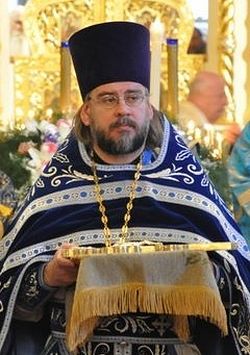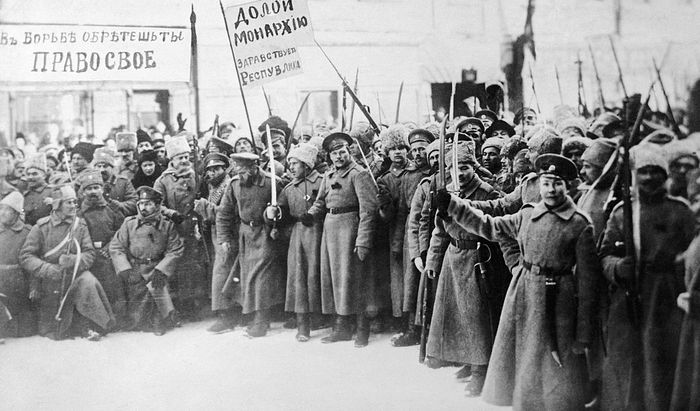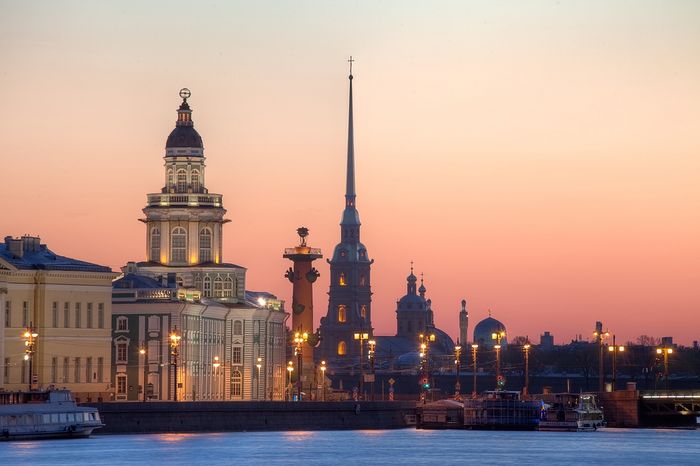On May 10-11, 2017, the 9th International Student Scholarly-Theological Conference will take place in St Petersburg, Russia, dedicated to the 100th anniversary of the labors of the Holy New Martyrs and Confessors of Russia and the convening of the Pomestny [Local] Church Council of Russia of 1917-1918. At the conference, undergraduate and graduate students of higher educational institutions of Russia, the “near” and “distant” diaspora will share their academic work, establish acquaintances and plan joint projects.
Eleven young singers from the Russian Orthodox Church Outside of Russia will participate, and also visit the holy sites of Russia’s northern capital.
The historic events of a century ago, the tenth anniversary of the unified Russian Orthodox Church, what role the examination of historic events and the strengthening of mutual bonds that young people play in the diaspora were the topics of a discussion with Protopriest Andrei Sommer, Vice President of the Synodal Youth Department of ROCOR.
 Protopriest Andrei Sommer —Why did the Revolution in Russia occur? How could such a great nation collapse? Why did several million Russian people flee their Fatherland in a bewildering and difficult time into oblivion?
Protopriest Andrei Sommer —Why did the Revolution in Russia occur? How could such a great nation collapse? Why did several million Russian people flee their Fatherland in a bewildering and difficult time into oblivion?
—Almost every Russian person has pondered these questions, both in Russia and abroad, for the last 80 years. Archives and historians give conflicting accounts and interpretations. The last eyewitnesses of those events who found themselves outside of their homeland have already passed to the next world. Their children and grandchildren remain, who don’t know as much about those events.
Historians of the Soviet era have conducted a great deal of research, but there were things that no one paid much attention to during Soviet times. Among them were the psychology and world view of the revolutionaries. These people, often having been believers in God at one time, became cruel, possessed with the notion of revolution, and ready to sacrifice not only their own lives for the idea, but the lives of others.
Orthodox Christianity teaches that a person finds happiness and meaning only in God. Such a life has a positive effect on a person, his family and in fact the state he lives in. But this ideal can be replaced with the notion of service to another god, in this case, revolution. Devoting one’s life to revolution might at first bring a degree of satisfaction, but in the end delivers sorrow and tragedy both to the revolutionary and to his family and entire nation.
 Inscriptions on the placards – 'In the struggle you will attain your right, 'Down with monarchy. Long live the Republic'
Inscriptions on the placards – 'In the struggle you will attain your right, 'Down with monarchy. Long live the Republic'
His Holiness Patriarch Kirill called the 1917 Revolution “a great crime.” At the foundation of the October Revolution lay the abandonment of spiritual values by the people. The people lost something extremely valuable: faith in and love for God and neighbor, they ceased caring about the sorrow of their fellow man. The main tragedy of the Russian nation is that, befogged by the idea of revolution, the people permitted the mockery of their faith, they allowed themselves to be divided into warring factions, to set political and social differences as a greater priority than national unity.
It is sad that Church society also became a part of the boiling cauldron of the Revolution: there were priests who rejoiced at the abdication of the Emperor, who accepted the Bolshevik revolt. But the history of the twentieth century includes many examples of self-sacrificing service to Christ. This is the host of Holy New Martyrs and Confessors of Russia. Today, this list includes over 1,700 known names.
For many decades, the new generations on both sides of the Soviet border did not sense the pain felt by the Russian Orthodox Church, they were unaware of the divisions in our Church, which their parents and grandparents endured. They are lucky. But we still need to know the reasons for what took place then.
Today we must objectively examine, and make an honest assessment of the history of our homeland over the last 100 years, since 1917. We cannot wait for historians to interpret it for us, to dot the i’s and cross the t’s.
Over the last 10 years, in the life of the unified Russian Church, we see young people meeting and actively discussing what happened a century ago. While historians may argue about the causes of the terrible events since 1917, we must strive to strengthen faith in God among our young people, so that the tragedy of a century ago is never repeated.
The main lesson our youth must take away from the last century is that one cannot build one’s life without God. Only by living according to Christ’s commandments will a people flourish and avoid the tribulations and terror of 1917, and the calamities of the following decades. The words of Bishop Nektary (Kontsevich) of Seattle ring true: “The main goal is to teach our young people to love God.”
—Why did you select St Petersburg as the destination for this anniversary?
—St Petersburg is the most beautiful city in Europe, the largest Christian center of Russia; a city which played a leading role in Russian history.
 St Petersburg. Photo: The Neva Room
St Petersburg. Photo: The Neva Room
St Petersburg is where the Revolution began, and our youth can see with their own eyes its historical monuments, which includes all of central St Petersburg and its outskirts, and sense the historical atmosphere. We will visit the places where the Royal Family lived, the churches in which they prayed.
I’ve been to St Petersburg more than once, and can bear witness to the fact that its people, including the local youth, are renowned for their hospitality. The Synodal Youth Department and St Vladimir Youth Association has developed closed ties with the youth of the St Petersburg Diocese, headed by Protopriest Konstantin Golovatsky. So the trip our youth choir will take should be very fruitful: our singers can make friends with their counterparts in St Petersburg, get to know each other better, they can pray together, discuss events from history, learn more about Russia’s past, and the young people of St Petersburg can learn about life abroad. All this should help strengthen their love for God, for their historic homeland and for each other.
—Over the last 10 years, since the signing of the Act of Canonical Communion, how has our understanding of history changed, and the relationship between youth in Russian and Abroad? What can help in this regard?
—“The duty of the Russian diaspora ws to preserve and pass on our spiritual values,” said Metropolitan Anastassy, First Hierarch of the Russian Church Abroad at the 2nd All-Diaspora Church Council in 1938. These words are very true. Assisting in strengthening our mutual understanding are joint projects, which since reconciliation in 2007 have multiplied in number. Over 1,000 young people have participated in joint pilgrimages, conferences, symposia, organized by our Synodal Youth Department and various organizations in Russia over the last 10 years.
This time our male choir, under the direction of Adrian Fekula, will sing Sunday Liturgy at St Alexander Nevsky Lavra before the relics of Holy Martyr Grand Duchess Elizabeth during the 9th Theological Conference, which is dedicated to the labors of the Holy New Martyrs of Russia. The choir will also perform at St Petersburg Theological Academy. We will also visit Efimovsky Correctional Facility and Orphanage of Leningrad oblast, where 100 children are educated.
At the present time, our “School Piggy Bank” project is collecting money for this orphanage. This is an expression of love by our children for their counterparts in Russia who are for one reason or another suffering a difficult fate.
I would like to note that this trip is being supported by St Vladimir Youth Association and also by the Fund for Assistance to the Russian Orthodox Church Outside of Russia.

https://www.voltairenet.org/IMG/pdf/Sutton_Wall_Street_and_the_bolshevik_revolution-5.pdf
Now they want to repeat it.
Is the Orthodox Church not aware of this?